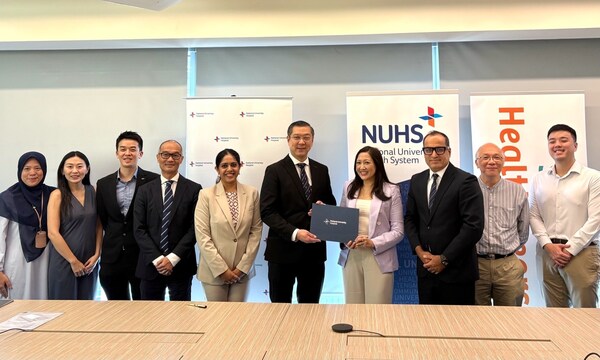Science
Siemens Healthineers and NUH Unite to Transform Liver Diagnostics

Siemens Healthineers has formed a strategic research partnership with the National University Hospital (NUH) in Singapore to enhance diagnostic solutions for Metabolic Dysfunction-Associated Steatotic Liver Disease (MASLD). This condition currently affects nearly 40% of adults in Singapore, significantly surpassing the global average of 30.05%. The collaboration aims to address the growing health crisis linked to rising obesity and metabolic disorders in the region.
The initiative will be spearheaded by Associate Professor Dan Yock Young, a Senior Consultant in the Division of Gastroenterology and Hepatology at NUH and a faculty member at the Yong Loo Lin School of Medicine, National University of Singapore. Recognized for his contributions to hepatology, Professor Young’s expertise will guide the project towards developing effective and patient-friendly diagnostic methods.
Innovative Technology for Improved Outcomes
The research will focus on evaluating Siemens Healthineers’ advanced ultrasound technologies, specifically the Ultrasound-Derived Fat Fraction (UDFF) and Auto Point Shear Wave Elastography (Auto pSWE). These tools provide non-invasive measurements of liver fat and stiffness during a single session, offering safer and more economical options compared to traditional MRI scans and invasive biopsies.
Vy Tran, President for Asia-Pacific Japan at Siemens Healthineers, emphasized the potential impact of these technologies, stating, “Our aim is to make ultrasound technologies accessible not only in tertiary hospitals but also at the polyclinic level.” By integrating these solutions into the liver care pathway, the partnership seeks to enable earlier detection and intervention, ultimately improving patient outcomes across the Asia-Pacific region.
Professor Young highlighted the significance of the collaboration, stating, “At NUH, we combine deep clinical expertise in liver and metabolic health, backed by strong translational research.” He noted that working with Siemens Healthineers positions them to pioneer new methods in the detection, treatment, and prevention of MASLD, benefiting many patients.
A Comprehensive Approach to Liver Care
This research initiative aligns with the upcoming National University Centre for Digestive Health, set to open in January 2026. The center aims to enhance patient access to innovative diagnostic tools, reinforcing the commitment to combat the silent epidemic of fatty liver disease in Singapore.
Chaitanya Mehrotra, Head of Ultrasound for Asia Pacific at Siemens Healthineers, remarked, “This collaboration reflects our shared responsibility to change that story. By bringing ultrasound innovation to the frontlines of care, we can empower physicians with better tools and offer patients not just accurate diagnostics, but hope for a healthier future.”
This partnership represents a significant step forward in addressing MASLD, leveraging NUH’s clinical expertise alongside Siemens Healthineers’ technological advancements. Both organizations are dedicated to pioneering breakthroughs in healthcare, striving to improve patient care and outcomes sustainably.
For further details, visit the Siemens Healthineers press room at: https://www.siemens-healthineers.com/en-sg/press-room/press-releases-sg/shs-nuh-masld-research.
-

 World5 months ago
World5 months agoSouth Korea’s Foreign Minister Cho Hyun to Visit China This Week
-

 Business5 months ago
Business5 months agoStarling Bank Plans Secondary Share Sale, Targeting $5.4 Billion Valuation
-

 Top Stories5 months ago
Top Stories5 months agoMunsang College Celebrates 100 Years with Grand Ceremony
-

 World5 months ago
World5 months agoPAS Aims to Expand Parliamentary Influence in Upcoming Election
-

 Business7 months ago
Business7 months agoKenvue Dismisses CEO Thibaut Mongon as Strategic Review Advances
-

 Lifestyle6 months ago
Lifestyle6 months agoHumanism Camp Engages 250 Youths in Summer Fest 2025
-

 Sports6 months ago
Sports6 months agoDe Minaur Triumphs at Washington Open After Thrilling Comeback
-

 Sports7 months ago
Sports7 months agoTupou and Daugunu Join First Nations Squad for Lions Clash
-

 Top Stories7 months ago
Top Stories7 months agoColombian Senator Miguel Uribe Shows Signs of Recovery After Attack
-

 World7 months ago
World7 months agoASEAN Gears Up for Historic Joint Meeting of Foreign and Economic Ministers
-

 Health6 months ago
Health6 months agoNew Study Challenges Assumptions About Aging and Inflammation
-

 Business7 months ago
Business7 months agoOil Prices Surge Following New EU Sanctions on Russia









